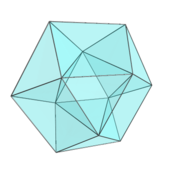Trigonal gyrobicupolic ring (EntityTopic, 17)
From Hi.gher. Space
(Difference between revisions)
m (moved Triangular gyrobicupolic ring to Trigonal gyrobicupolic ring: triangular -> trigonal) |
(add software models) |
||
| (3 intermediate revisions not shown) | |||
| Line 1: | Line 1: | ||
| - | <[#ontology [kind topic] [cats | + | <[#ontology [kind topic] [cats Bicupolic_ring]]> |
{{STS Shape | {{STS Shape | ||
| - | | image=<[# | + | | image=<[#embed [hash N2BYGAZRMM4R665BCK6WTK7XT0] [width 180]]> |
| dim=4 | | dim=4 | ||
| genus=0 | | genus=0 | ||
}} | }} | ||
| - | The ''' | + | The '''trigonal gyrobicupolic ring''' is a [[CRF polychoron]] discovered by [[Keiji]]. It is a member of the family of [[bicupolic ring]]s, which contains eight other similar polychora. It is formed by attaching two [[trigonal cupola]]e by their [[hexagon]]al faces, folding them into the fourth dimension with their [[trigon]]al ends connected by an [[octahedron]], and then filling in the gaps with 6 [[square pyramid]]s. |
== Cartesian coordinates == | == Cartesian coordinates == | ||
| Line 18: | Line 18: | ||
(1/sqrt(3), ±1, -sqrt(2/3), sqrt(2)) | (1/sqrt(3), ±1, -sqrt(2/3), sqrt(2)) | ||
(-2/sqrt(3), 0, -sqrt(2/3), sqrt(2)) | (-2/sqrt(3), 0, -sqrt(2/3), sqrt(2)) | ||
| + | |||
| + | ==Software models== | ||
| + | |||
| + | *[[Polyview]] [http://hddb.teamikaria.com/dl/Y53J6WB1V8PXGRHFA9A627YP2H.def .def file] | ||
| + | *[[Stella4D]] [http://hddb.teamikaria.com/dl/TPB025DH9HQZYMNZPJ9Z86JZK1.off .off file] | ||
Latest revision as of 22:59, 23 May 2014
The trigonal gyrobicupolic ring is a CRF polychoron discovered by Keiji. It is a member of the family of bicupolic rings, which contains eight other similar polychora. It is formed by attaching two trigonal cupolae by their hexagonal faces, folding them into the fourth dimension with their trigonal ends connected by an octahedron, and then filling in the gaps with 6 square pyramids.
Cartesian coordinates
Hexagon:
(±sqrt(3), ±1, 0, 0) (0, ±2, 0, 0)
Triangle 1:
(-1/sqrt(3), ±1, sqrt(2/3), sqrt(2)) (2/sqrt(3), 0, sqrt(2/3), sqrt(2))
Triangle 2:
(1/sqrt(3), ±1, -sqrt(2/3), sqrt(2)) (-2/sqrt(3), 0, -sqrt(2/3), sqrt(2))

